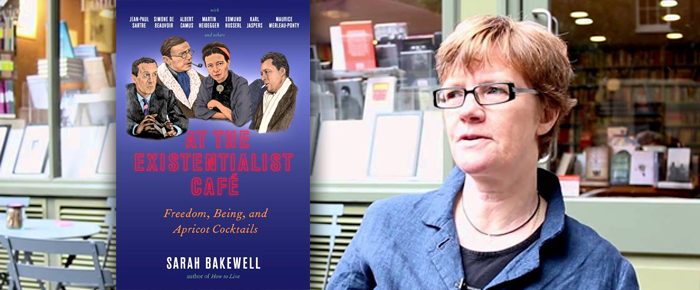
By Heidi Simmons
—–
At The Existentialist Café
by Sarah Bakewell
Nonfiction
—–
I don’t know what it’s like in your house when the family is gathered around the table, but at mine, the conversation more often than not, turns to the big questions of life: What does it mean to be alive? Why is there something and not nothing? What’s real?
At The Existentialist Café: Freedom, Being, and Apricot Cocktails with Jean-Paul Sarte, Simone de Beauvoir, Albert Camus, Martin Heidegger, Maurice Merleau-Ponty and Others, by Sarah Bakewell (Other Press, 448 pages), reveals a crazy world where asking unanswerable questions is normal.
Author Bakewell begins her book in Paris at the Bec-de-Gaz bar in 1932, where three twenty-somethings are sipping apricot cocktails. A little bored and with no other gossip to discuss, they turn to something new — a conversation about existence.
At the table are Jean-Paul Sartre and Simone de Beauvoir, who are boyfriend and girlfriend, and the third-wheel, school chum, Raymond Aron.
Just back from Berlin, Aron shares a philosophy he discovered called “phenomenology.” As a phenomenologist, he describes to his pals that you can talk about the apricot cocktail and make a philosophy about it.
There is only one question that matters, the question of being. Aron insists that without asking “the question” one would never get anywhere. Phenomenology disregards intellectual clutter in order to pay attention to the things around you so they can reveal themselves to you.
This nonsense thrilled Sartre and Beauvoir. From here the fire was lit and existentialism was on its way. Authentic being! After Sartre and Beauvoir explored the idea around Paris, each was stimulated to apply this new idea to their lives.
Sartre eventually distilled it into three words, “Existence precedes essence.” A human exists first before they have meaning. Sartre implies that it is possible to be authentic and free, although it takes effort.
Freedom became the existential mantra. Nothing stops us but our own free choosing. Beauvoir was inspired. Sartre became world famous.
I am not a philosophy major, never the less, this book was a fun read because author Bakewell makes their lives so vivid. Sartre and Beauvoir at times mock philosophy and admit it is silly to try to define reality or explain existence. Bakewell makes all the big thinkers in the book real people. She connects the dots between philosophers and philosophies.
Most interesting to me, was how the thinking was likely shaped by the time period between the Great War and the start of the Second World War.
Kierkegaard, Nietzsche, Husserl, Heidegger, Merleau-Ponty and many others became real people to me for the first time. Not sure what I thought they were before, but they seemed above reproach and almost like gods rather than ordinary people who struggled with life, trying to understanding their own reality.
There is much more to this book than understanding evolving philosophy. It has sex, drugs and whatever the equivalent to rock ‘n roll was for the time. There are playwrights, revolutionaries, convicts and anthropologists.
At the Existential Café is clearly a labor of love for author Bakewell. She writes conversationally and has an easy manner rather than an academic tone. She includes a cast of characters, an index and page notes, which adds up to over 120 pages so don’t be intimidated by the page count.
This is a book for readers who enjoy ideas and eccentric characters. It really brings pure thought to life and puts philosophy on a more comprehendible level. I found unexpected delights in this provocative volume. However, I did have to read it with a pencil in hand.








































